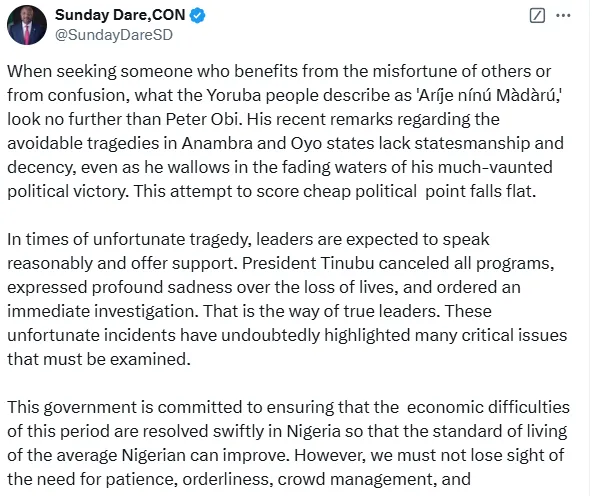
Exploring Allegations: Did Peter Obi Profit from Others’ Misfortunes?
In response to recent tragic stampedes in Nigeria, Sunday Dare, Special Adviser on Media and Public Communication to President Bola Tinubu, criticized former Labour Party presidential candidate Peter Obi for his comments on the incidents.
Dare accused Obi of exploiting these tragedies for political gain, describing his remarks as lacking statesmanship and decency. He stated, “When seeking someone who benefits from the misfortune of others or from confusion—what the Yoruba people describe as ‘Aríje nínú Màdàrú’—look no further than Peter Obi.”
These criticisms followed Obi’s statements regarding stampedes in Anambra and Oyo states, where he attributed the incidents to systemic failures and the prevailing economic hardships in the country.
Obi expressed his condolences to the affected families and highlighted the need for improved governance to prevent such occurrences.
Dare emphasized that in times of tragedy, leaders should act responsibly and offer support.
He noted that President Tinubu canceled all engagements, expressed profound sadness over the loss of lives, and ordered an immediate investigation into the incidents, which he described as the actions of true leadership.
The stampedes in question resulted in significant loss of life, including over 40 children in Ibadan, Oyo State, and several individuals in Anambra State during the distribution of palliatives.
These events have sparked national conversations on event safety, governance, and the responsibilities of both leaders and citizens in preventing such tragedies.
Dare’s remarks underscore the administration’s commitment to addressing the economic challenges facing Nigeria and improving the standard of living for its citizens.
He also highlighted the importance of patience, orderliness, and proper crowd management to prevent future incidents.
This exchange reflects the ongoing political discourse in Nigeria, where leaders are scrutinized for their responses to national tragedies and the implications of their statements on public perception and national unity.
